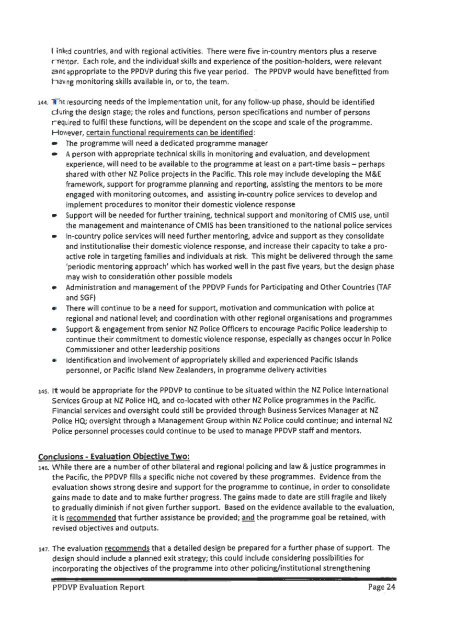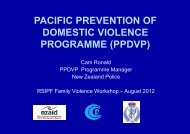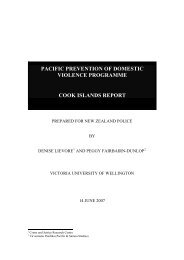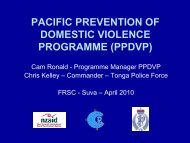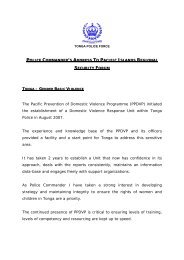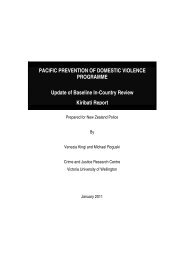PPDVP Evaluation Report - Pacific Prevention of Domestic Violence ...
PPDVP Evaluation Report - Pacific Prevention of Domestic Violence ...
PPDVP Evaluation Report - Pacific Prevention of Domestic Violence ...
Create successful ePaper yourself
Turn your PDF publications into a flip-book with our unique Google optimized e-Paper software.
1 inked countries, and with regional activities. There were five in-country mentors plus a reservementor. Each role, and the individual skills and experience <strong>of</strong> the position-holders, were relevantand appropriate to the <strong>PPDVP</strong> during this five year period. The <strong>PPDVP</strong> would have benefitted fromhav~ng monitoring skills available in, or to, the team.1-44. f h~ies~urcing needs <strong>of</strong> the implementation unit, for any follow-up phase, should be identifiedduring the design stage; the roles and functions, person specifications and number <strong>of</strong> personsrequired to fulfil these functions, will be dependent on the scope and scale <strong>of</strong> the programme.-However, certain functional reauirements can be identified:The programme will need a dedicated programme managerA person with appropriate technical skills in monitoring and evaluation, and developmentexperience, will need to be available to the programme at least on a part-time basis - perhapsshared with other NZ Police projects in the <strong>Pacific</strong>. This role may include developing the M&Eframework, support for programme planning and reporting, assisting the mentors to be moreengaged with monitoring outcomes, and assisting in-country police services to develop andimplement procedures to monitor their domestic violence responser-Support will be needed for further training, technical support and monitoring <strong>of</strong> CMlS use, untilthe management and maintenance <strong>of</strong> CMlS has been transitioned to the national police servicesIn-country police sewices will need further mentoring, advice and support as they consolidateand institutionalise their domestic violence response, and increase their capacity to take a proactiverole in targeting families and individuals at risk, This might be delivered through the same'periodic mentoring approach' which has worked well in the past five years, but the design phasemay wish to consideration other possible modelsAdministration and management <strong>of</strong> the <strong>PPDVP</strong> Funds for Participating and Other Countries (TAFand SGF)There will continue to be a need for support, motivation and communication with police atregional and national level; and coordination with other regional organisations and programmes.I Support & engagement from senior NZ Police Officers to encourage <strong>Pacific</strong> Police leadership tocontinue their commitment to domestic violence response, especially as changes occur in PoliceCommissioner and other leadership positionsr Identification and involvement <strong>of</strong> appropriately skilled and experienced <strong>Pacific</strong> Islandspersonnel, or <strong>Pacific</strong> Island New Zealanders, in programme delivery activities14s. It would be appropriate for the <strong>PPDVP</strong> to continue to be situated within the NZ Police InternationalServices Group at NZ Police HQ, and co-located with other NZ Police programmes in the <strong>Pacific</strong>.Financial services and oversight could still be provided through Business Services Manager at NZPolice HQ; oversight through a Management Group within NZ Police could continue; and internal NZPolice personnel processes could continue to be used to manage <strong>PPDVP</strong> staff and mentors.Conclusions - <strong>Evaluation</strong> Obiective Two:146. While there are a number <strong>of</strong> other bilateral and regional policing and law & justice programmes inthe <strong>Pacific</strong>, the <strong>PPDVP</strong> fills a specific niche not covered by these programmes. Evidence from theevaluation shows strong desire and support for the programme to continue, in order to consolidategains made to date and to make further progress. The gains made to date are still fragile and likelyto gradually diminish if not given further support. Based on the evidence available to the evaluation,it is recommended that further assistance be provided; and the programme goal be retained, withrevised objectives and outputs.147. The evaluation recommends that a detailed design be prepared for a further phase <strong>of</strong> support. Thedesign should include a planned exit strategy; this could include considering possibilities forincorporating the objectives <strong>of</strong> the programme into other policing/institutional strengthening<strong>PPDVP</strong> <strong>Evaluation</strong> <strong>Report</strong> Page 24


